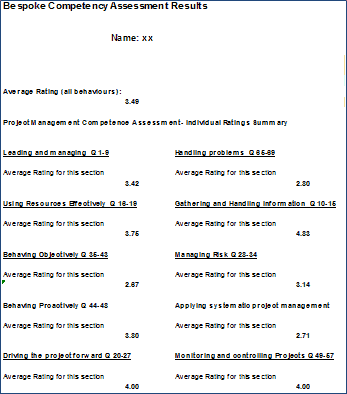If you need to truly develop project management performance, you need to consider the word ‘competence’ not just knowledge. Competence in the words of the OED means someone’s ability or potential to manage a project to a defined performance standard and in projects, the standard is delivering on time, within budget the specification.
Developing your teams to this requisite level of performance can be achieved through the appropriate targeting and use of the development center approach. Development centres have the dual benefits of a) raising the standard of the individual attending and b) identifying and classifying the nature of training needs for the organisation as a whole. This leads to a much more focussed and effective use of training resources.
Development centres use skilled assessors to observe participants’ behaviour in a whole range of simulated situations, exercises, role plays, interviews and desk exercises to gather information about their strengths and development needs.
Development Centre is a day or number of days where the participants are actively involved in the assessment of their own and others behaviours as part of their professional development.
http://www.psychometric-success.com/assessment-centers/acfaq-development-centre.htm
They work by comparing exercise behaviour against a competence profile – a detailed description of the behaviour that successful project managers display when at work. An accurate profile includes relevant personal characteristics such as self-motivation, determination; inter personal skills and the underpinning knowledge, as it is based on an all-round picture of a competent performer – “what good looks like”. It is written in terms of behaviour because this is observable and measurable. The output of a development centre is information on individual strengths and development needs, which can be used to target training at developing behaviour like that shown by successful project managers, improving job performance.
An accurate profile is clearly crucial for effective development centres, and they can be derived from two main sources. One is observation of behaviour of a group of project managers at work. Results are analysed to answer the following question; “What behaviour did the more successful project managers in the group have in common?” (The level of success of the people in the group has to be established of course). It is also useful if aspects of the environment that affect performance are considered as well. An alternative is to select a group of known high performers and use a specialised interview method to gather the same information – what is it in their behaviour, skills, knowledge etc, that makes them perform better than others? In both approaches, the objective is to identify the behaviour that makes a difference to project management performance. Parallel Project Management Training has its own empirical project management competence profile developed from a large body of behavioural observation in the workplace. Empirical profiles have the benefit that they are based on actual observation and can be validated against a specific working environment
A second source of profile information is one produced by your own organization or an external one, such as the APM’s Competence Framework or the IPMA’s International Competence Baseline, (ICB). These would be used in development centres in the same way as the empirical profile with the appropriate exercises.
In summary, the main advantage of a development centre approach is accurate competence assessment of individuals. This leads to better targeted, more effective training. Profile accuracy comes from actual observation of successful practitioners or from the work of professional bodies such as the APM in considering what a successful project manager should “look like”. A further advantage is that client’s own high performers can be involved as assessors in development centres. This brings them closer to the process and encourages management participation in and support for, the training and development initiative.
Steps in Development Centre Implementation
1) Define what represents good based on internal research or external standards such as APM competence framework.
2) Complete a self-assessment against the expected behaviours using the APM self-assessment or a bespoke competence assessment.
3) Validate the results by assessment or interview.
4) Identify and agree development actions.
